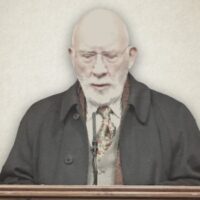
‘Particular Baptist Church’ Polity And Organization During The Eighteenth Century
An Extract From George Ella’s Book, “John Gill And The Cause Of God And Truth”, Pages 54,55. A Printed Copy Of This Book May Be Obtained From Go Publications (£13/$16).
The records of Gill’s ordination service have provided church historians with a complete picture of how the Particular Baptists were organized at the beginning of the eighteenth century. It is clear that they only elected one elder per church, who was also their pastor, who then presided over a number of deacons.[1] Though many pastors were present at Gill’s ordination ceremony, they were referred to by Crosby in his records as ‘elders’. This might indicate that the Baptists had some idea of a church universal with elders belonging to it which were not members of the local church but fellow members of the body of Christ. In their confessions of faith, however, they tended to define the local church as if it excluded any membership of a wider church concept. This wider church concept, however, in many Baptist churches, had begun to take the form of fraternals, associations, societies and unions. They, in turn, tended to isolate the normal church members from fellowship with the other churches as only representatives called ‘messengers’ took an active part in inter-church dealings. Gradually these associations and unions, with their representative membership only, elected non-church-based hierarchies with no doctrinal creeds who saw themselves as ruling bodies over local churches.[2] Gill was to do much in his pastorate to curb this downgrading of a true church conception but he was very much a lone voice and his successor John Rippon went back to the old para-church policies. By the time Charles Haddon Spurgeon became pastor of Gill’s church after Rippon, over a hundred years later, the situation had become so bad that a doctrineless Baptist Union dominated the majority of local churches, ruling them from outside. Churches founded abroad by British missionaries were ruled by a committee of men in the Baptist Missionary Society who opened their membership to anyone who would pay 10/6 , irrespective of their beliefs. Declaring that he was taking up the mantle cast down at Gill’s death, Spurgeon took up the postponed fight again for the rights of the local church over external organizations, patronages and societies. Spurgeon had a measure of success in his reforming plans for the Baptist Missionary Society but he failed sadly in his opposition to the Baptist Union who continued to put organizational unity sealed by the rite of baptism before a common faith.
——————————-
[1] Ivimey gives the exception of a Bristol church that traditionally elected a co-pastor. See vol. iv, pp. 283-289.
[2] There were exceptions regarding statements of faith. The London Particular Baptist Board demanded that its members be Calvinists and the Western Association required their members to sign the 1689 Confession from around 1733 onwards. In 1782, for instance, the Kent and Sussex Association headed their Association Letter with a brief statement of faith.
George M. Ella, born February 1939 in Yorkshire, England, has lived most of his life on the European Continent. He is a retired Senior Civil Servant formerly employed in teaching, post-graduate teacher-training, chairing examination boards and curricula work. He holds degrees from London, Hull, Uppsala, Essen, Duisburg and Marburg universities with doctorates in English Literature and Theology. Dr. Ella has written regularly since the seventies for a number of magazines and newspapers and published numerous books on Church History, including biographies of William Cowper, William Huntington, James Hervey, John Gill, Augustus Montague Toplady, Isaac McCoy and Henry Bullinger besides works on doctrine and education. He is currently finishing the third volume of his series 'Mountain Movers'; a biography of John Durie; a work on Law and Gospel and further study material for the Martin Bucer Seminar. Dr. Ella is still internationally active as a lecturer and is a Vice-President of the Protestant Reformation Society. He is keenly interested in missionary work and has written on the spread of the Gospel amongst the Same people of Lapland, the people of India and the Native Americans. This present volume follows Dr. Ella's 'The Covenant of Grace and Christian Baptism', also published by the Martin Bucer Seminar. George Ella is married to Erika Ella, nee Fleischman, a former government administrator, and they have two sons Mark (41), Director of a Polytechnic College in Bremerhaven and Robin (39), Leading Senior Physician in a newly-built Geriatric and Psychiatric clinic in Dessau.
George Ella on Doctrinal Matters
George Ella's Biographical Sketches




